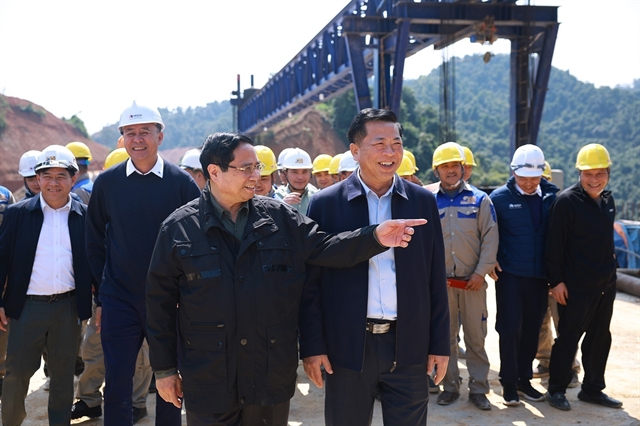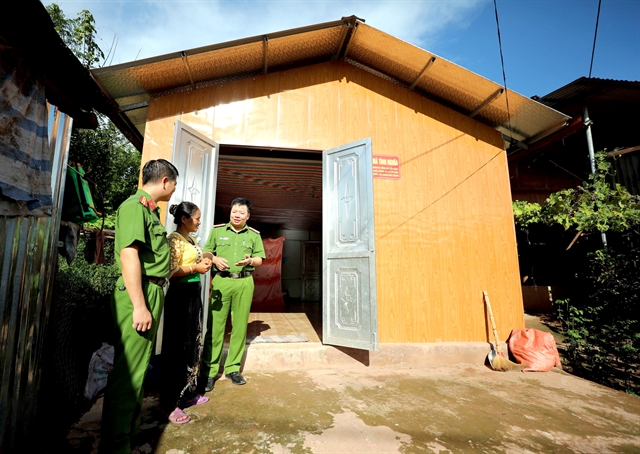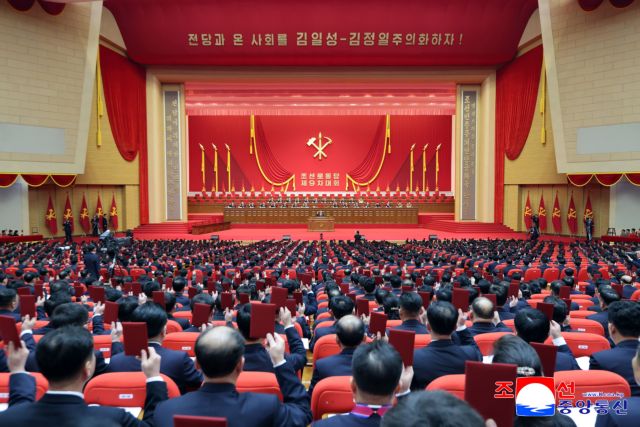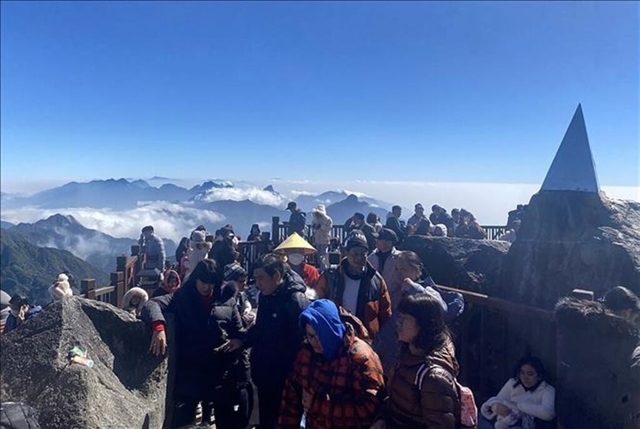 Society
Society
.jpg)
Thousands of people in Mường Nhé District in the northern mountainous province of Điện Biên are enjoying better lives after being given homes, farmland and jobs thanks to Government support policies over the past ten years.

|
| Lò Thị Quyết speaks with local police next to a new house she has given thanks to a project launched by the Ministry of Public Security. VNA/VNS Photo Nhật Anh |
HÀ NỘI — Thousands of people in Mường Nhé District in the northern mountainous province of Điện Biên are enjoying better lives after being given homes, farmland and jobs thanks to Government support policies over the past ten years.
However, more still needs to be done to help them eradicate poverty.
Mường Nhé Commune in Mường Nhé District is among the poorest areas in the country. At the resettlement area in Nậm Là 2 Village, there are 41 households H’Mông ethnic households.
In an old wooden house, 44-year-old Vàng A Mai makes wooden tables and chairs to earn a living. His family is among the poor households that migrated from Sơn La Province in 2017.
Now he has been given land to build a house and farmland to cultivate acacia trees, and he works as a carpenter to supplement his income. Life is much better for Mai now, but he still struggles every day.
“My village is more than 200 metres from Expressway 4H, and it becomes isolated in the rainy seasons. There are no bridges, and the soil is low-quality so productivity remains low. I make about VNĐ1 million ($43) per month,” he said.
“Life is still difficult, so I have to try more,” he added.
Lò Thị Quyết, a 34-year-old Thai ethnic woman living in Mường Nhé Commune, said she was always thinking about how to escape poverty.
A shortage of money, the isolated area, disrupted traffic and outdated farming methods are all holding her back.
“My family has a small field of rice and corn, and a flock of chickens and some pigs in the barn. We earn an average of VNĐ1 million ($43) per month,” she said.
“Sometimes we are hit by disease. My family lost four pigs when African swine flu broke out. We’re still trying our best to make life better,” she said.
Vàng A Mai and Lò Thị Quyết come from two of the poorest households in the district, where up to 62 per cent of people live in poverty. They still face many difficulties, but life is gradually getting better.
The district’s People’s Committee said since the district was established in 2002, many Government’s support projects for ethnic minority areas had been implemented.
The district has focused on building infrastructure. Irrigation plants, clean water supplies, schools, roads and a power grid have been built and put into use.
People's Committee Chairman Vùi Văn Nguyện said the district had focused on providing jobs to create stable incomes for local people. It had created jobs for more than 7,000 people in the past ten years.
The district has also experimented with crops and animals of higher economic value to adapt to the climate and soil in the district, while forming co-operatives for agricultural production and consumption.
Paying people to protect the forests had also created additional incomes, he said.
Reports from the Central Steering Committee of the National Target Programme for Sustainable Poverty Reduction for 2016-2020 showed that although the socio-economic situation had improved, poverty reduction remained unsustainable in some localities.
The rate of households falling back into poverty from 2016-2019 was 4.09 per cent of the total that had previously managed to escape.
The rate of new poor households and the rich-poor divide was also relatively large.
To improve the situation, a national programme for sustainable poverty reduction and social security from 2021-2025 has been chalked out.
This programme aims to eradicate poverty in all localities, improve the quality of human resources, and create adequate jobs for everyone in an attempt to ensure social security and reduce inequality. — VNS
.jpg)



